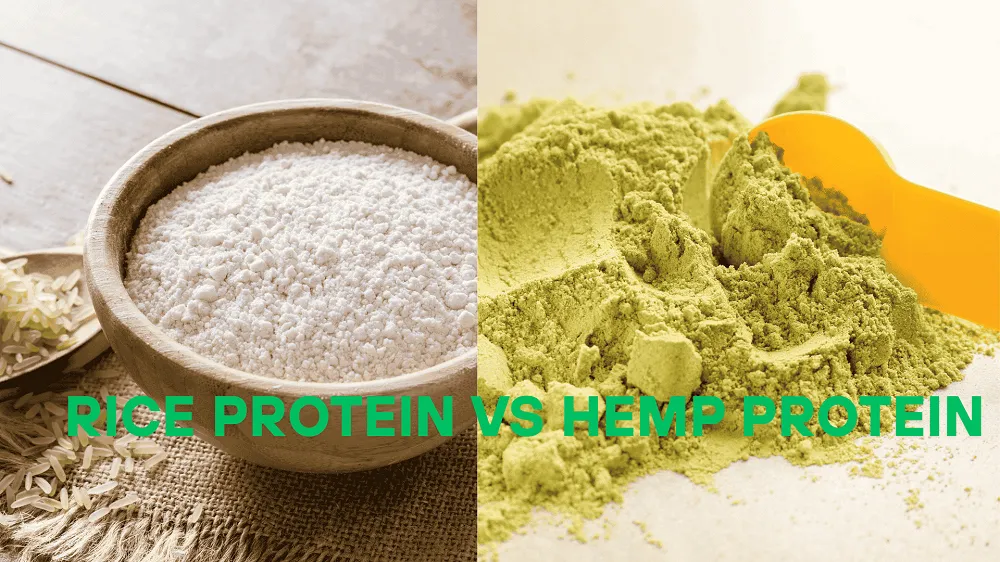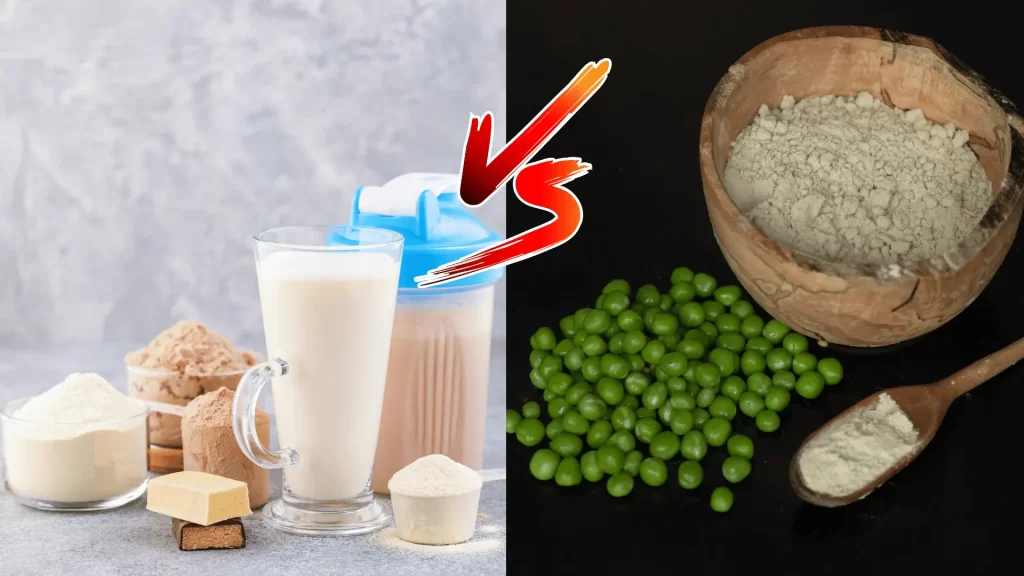Plant-based proteins are booming, with rice protein vs hemp protein standing out as top choices for vegan, allergen-free nutrition. As the plant-based protein market heads toward $20.8 billion by 2028, these proteins offer sustainable options for muscle building, weight management, and overall health. As a leading supplier of food supplement ingredients and OEM solutions, we’re here to compare rice protein vs hemp protein, covering their sources, benefits, and uses. This guide uses simple language, science-backed facts, and practical tips to help you choose the best protein for your goals, whether it’s fitness, health, or sustainability.
Understanding Plant-Based Proteins
Proteins are essential for building muscles, repairing tissues, and keeping energy levels high. Plant-based proteins like rice protein vs hemp protein are vegan-friendly, eco-conscious alternatives to animal proteins like whey. They’re often easier to digest and better for the planet, with lower water and carbon footprints.
Why Plant-Based Proteins?
- Perfect for vegan, vegetarian, or allergen-free diets.
- Sustainable, using fewer resources than animal proteins.
- Support muscle growth, weight loss, and general wellness.

Complete vs. Incomplete Proteins: A complete protein has all nine essential amino acids your body can’t make. Most plant proteins are incomplete, but combining them (like rice and hemp) can provide a full amino acid profile.
Rice Protein: Sources and Characteristics
Rice protein is made from brown rice, processed with enzymes to isolate the protein. It’s a go-to choice for its mild flavor and hypoallergenic nature.
Sources:
- Comes from whole brown rice grains.
- Found in small amounts in rice, so supplements offer a concentrated dose (70–80% protein).
Protein Type:
- Incomplete protein, low in lysine but high in methionine and cysteine.
- Needs pairing with lysine-rich foods (e.g., beans) for a complete profile.
Key Features:
- Hypoallergenic, great for people with food sensitivities (does rice protein cause bloating? Rarely, it’s gentle on the stomach).
- Smooth texture, ideal for shakes, smoothies, or baking.
- Affordable and versatile for various diets.
Hemp Protein: Sources and Characteristics
Hemp protein comes from hemp seeds (Cannabis sativa), typically cold-pressed or milled. It’s nutrient-dense and popular for its unique benefits.
Sources:
- Sourced from hemp seeds, a sustainable crop.
- Present in whole seeds, but supplements provide higher protein (50–70% protein content).
Protein Type:
- Complete protein, with all nine essential amino acids (are hemp seeds a perfect protein?), though lower in lysine compared to pea protein.
- Rich in omega-3s, fiber, and minerals like magnesium and iron.
Key Features:
- Nutty flavor, slightly grainy texture.
- High fiber content supports digestion but may cause bloating in some.
- Often organic, appealing to eco-conscious consumers.
Comparing Rice Protein vs Hemp Protein
Here’s a comparison table to highlight differences in rice protein vs hemp protein:
| Aspect | Rice Protein | Hemp Protein |
|---|---|---|
| Source | Brown rice | Hemp seeds |
| Protein Type | Incomplete (low lysine) | Complete (lower lysine) |
| Digestibility (PDCAAS) | 0.50–0.70 | 0.46–0.51 |
| Best For | Sensitive stomachs, versatility | Nutrient density, muscle support |
| Allergens | Rare (rice allergies) | Rare (hemp allergies) |
| Extras | Lean protein | Omega-3s, fiber, minerals |
Science Says: A 2018 study in Journal of the International Society of Sports Nutrition found rice protein supports muscle growth when paired with other proteins, matching whey in some cases. A 2019 Nutrients study showed hemp protein’s complete amino acids and omega-3s aid muscle recovery and heart health (will hemp protein build muscle?). Combining rice protein vs hemp protein creates a balanced, complete protein for optimal benefits.
Benefits and Applications
Both rice protein vs hemp protein offer unique advantages for health and fitness.
Rice Protein Benefits
- Muscle Recovery: Provides methionine for tissue repair, great for post-workout (is rice good for bulking or cutting? Both, especially cutting due to low calories).
- Digestive Health: Gentle and hypoallergenic, rarely causes bloating (does rice protein cause bloating? No, it’s one of the easiest to digest).
- Weight Management: Low-calorie, supports satiety for healthy diets (is rice protein powder good for you? Yes, especially for weight control).
Hemp Protein Benefits
- Muscle Building: Complete protein supports muscle growth, though less leucine than pea protein (will hemp protein build muscle? Yes, with consistent use).
- Heart Health: Omega-3s reduce inflammation and support blood flow, per a 2017 American Journal of Clinical Nutrition study.
- Digestion and Satiety: High fiber promotes gut health and fullness, though it may cause bloating in sensitive individuals.
Combined Benefits
Blending rice protein vs hemp protein enhances their strengths:
- Combines rice’s methionine with hemp’s lysine for a complete protein.
- Boosts muscle growth, digestion, and nutrient density.
- Ideal for vegan athletes or those seeking balanced nutrition.
Applications: Used in protein powders, shakes, bars, and baked goods. Perfect for:
- Athletes building muscle or recovering post-workout.
- Vegans needing complete proteins.
- Health-conscious consumers prioritizing sustainability.
Sourcing High-Quality Rice and Hemp Protein
Quality is critical for effective rice protein vs hemp protein supplements. As a leading supplier of food supplement ingredients and OEM solutions, we ensure:
- Purity: GMP-certified rice and hemp protein powders with 50–80% protein content.
- Sustainability: Organic, non-GMO rice from eco-friendly farms and hemp from regulated, THC-free sources (is hemp protein safe for kidneys? Yes, with high-quality sourcing).
- Allergen-Free: Free from common allergens, with third-party testing for safety.
- OEM Services: Custom blends (e.g., rice protein vs hemp protein with P5P zinc and magnesium), packaging, and global compliance.
Why Choose Us? Our premium raw materials help brands create top-tier vegan supplements for the $20.8 billion market. We support startups and established companies with tailored formulations, ensuring market-ready products.
Dosage and Usage Guidelines
Here’s how to use rice protein vs hemp protein effectively, based on ISSN guidelines:
| Protein Type | Recommended Dosage | Best Practices |
|---|---|---|
| Rice Protein | 20–30 g/day (muscle); 10–20 g/day (general) | Mix in smoothies, water, or bake into bars |
| Hemp Protein | 20–30 g/day (athletes); 10–15 g/day (daily) | Blend in shakes or add to oatmeal |
Tips for Use:
- Timing: Post-workout for muscle recovery or morning for energy. Daily use is safe for most (is hemp the best protein? Not always, but great for nutrient density).
- Mixing: Rice protein blends smoothly; hemp’s grainy texture pairs well with fruits or nuts in smoothies.
- Combinations: Mix rice and hemp for a complete amino acid profile. Add P5P zinc and magnesium for enhanced recovery (available in our OEM blends).
Potential Side Effects and Precautions
Both rice protein vs hemp protein are generally safe, but here’s what to know:
Rice Protein
- Side Effects: Rare digestive upset; rice allergies are uncommon (does rice protein cause bloating? No, it’s highly digestible).
- Precautions: Safe for most, but consult a doctor for kidney issues or high-protein diets (is hemp protein safe for kidneys? Rice is equally safe).
Hemp Protein
- Side Effects: High fiber may cause bloating in sensitive stomachs (why avoid hemp? Only if fiber-sensitive or in regions with hemp restrictions).
- Precautions: Avoid if allergic to hemp or concerned about trace THC (our hemp protein is THC-free).
General Advice: Consult a doctor if pregnant, breastfeeding, or managing conditions like kidney disease. Our high-purity proteins minimize risks with clean, tested ingredients (what is the healthiest protein supplement? Both are healthy when sourced responsibly).
Comparison Table: Practical Considerations
This table helps you choose between rice protein vs hemp protein:
| Factor | Rice Protein | Hemp Protein | Best Choice |
|---|---|---|---|
| Muscle Building | Moderate | Good (complete protein) | Hemp for athletes |
| Digestibility | Gentle, hypoallergenic | High fiber, may bloat | Rice for sensitive stomachs |
| Taste | Smooth, mild | Nutty, grainy | Rice for versatility |
| Nutrients | Lean protein | Omega-3s, fiber, minerals | Hemp for extras |
| Cost | More affordable | Slightly pricier | Rice for budget |
Key Takeaway: Choose rice protein for digestion and affordability, hemp protein for nutrient density, or a blend for complete nutrition.
Types of Supplements Made from Rice Protein and Hemp Protein
- Overview of supplement forms for rice protein vs hemp protein:
- Protein Powders: Most common, used in shakes or smoothies; rice for smooth texture, hemp for nutrient density.
- Liquids: Ready-to-drink shakes or beverages; hemp’s nutty flavor suits savory drinks, rice blends well in neutral ones.
- Gummies: Emerging trend for portable, tasty protein delivery; rice protein’s mild taste is ideal.
- Capsules: Convenient for precise dosing, often used for hemp protein’s nutrient profile.
- Bars: Meal replacements or snacks; both proteins work well, often blended for complete amino acids.
- Functional Foods: Added to cereals, baked goods, or spreads; rice for baking, hemp for nutrient boosts.
- Benefits of each form: Convenience, taste, and suitability for different lifestyles.
- Our OEM expertise: We create custom rice protein vs hemp protein powders, gummies, or liquids with GMP-certified ingredients.
Conclusion
Rice protein vs hemp protein offers unique benefits for vegan, health-conscious consumers. Rice protein is gentle and versatile, perfect for sensitive stomachs or baking. Hemp protein, with its complete amino acids and omega-3s, supports muscle growth and heart health. Blending them creates a powerful, complete protein for athletes and everyday use. As a leading supplier of rice protein vs hemp protein raw materials and OEM solutions, we provide GMP-certified, sustainable ingredients to help brands create top-tier supplements. Ready to launch your vegan protein line? Contact us to source premium rice protein vs hemp protein or develop custom formulations for the $20.8 billion market.
What is the best vegan protein powder?
The best depends on goals: rice protein for sensitive stomachs, hemp for nutrient density (rice protein vs hemp protein). Blends of both offer complete proteins, rivaling pea or soy. Our GMP-certified blends are ideal.
What type of protein powder is best?
Rice protein suits allergies and versatility; hemp offers omega-3s and fiber. Blends are best for complete amino acids (is hemp the best protein? Not always, but great for holistic nutrition).
Are hemp seeds a perfect protein?
Hemp seeds are a complete protein with all nine essential amino acids, but lower lysine limits their “perfect” status. Combining with rice protein enhances efficacy.
Is rice good for bulking or cutting?
Rice protein works for both: bulking (muscle recovery) and cutting (low-calorie, filling). It’s versatile for fitness goals.
Why avoid hemp?
Avoid hemp if sensitive to fiber (may cause bloating) or in regions with strict hemp regulations. Our THC-free hemp protein ensures safety.
References
- National Institutes of Health. (2023). Dietary Supplements for Exercise and Athletic Performance. https://ods.od.nih.gov/factsheets/ExerciseAndAthleticPerformance-HealthProfessional/
- Gorissen, S. H. M., et al. (2018). “Protein content and amino acid composition of commercially available plant-based protein isolates.” Journal of the International Society of Sports Nutrition, 15(1), 41. doi:10.1186/s12970-018-0244-0
- Callaway, J. C. (2004). “Hempseed as a nutritional resource: An overview.” Euphytica, 140(1), 65–72. doi:10.1007/s10681-004-4811-6
- Joy, J. M., et al. (2013). “The effects of rice protein vs. whey protein on muscle thickness.” Nutrition Journal, 12(1), 86. doi:10.1186/1475-2891-12-86
- Rodriguez-Leyva, D., & Pierce, G. N. (2017). “The cardiac and haemostatic effects of dietary hempseed.” American Journal of Clinical Nutrition, 105(4), 849–857. doi:10.3945/ajcn.116.144220


